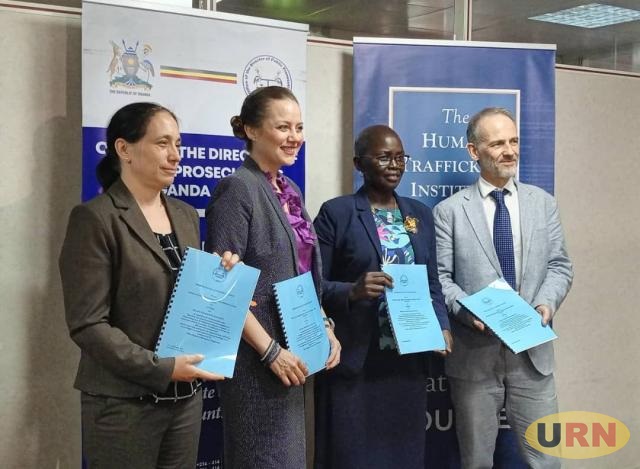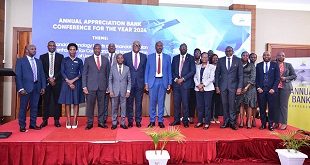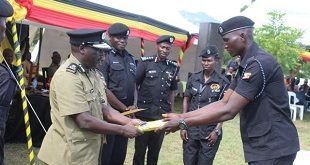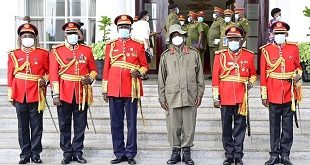
Kampala, Uganda | THE INDEPENDENT | The Police have reported to the Director of Public Prosecutions(DPP), Jane Frances Abodo that there has been a decline in the reported cases of trafficking in persons nationwide in the past year as compared to 2022.
According to the Commissioner of Police Julius Twinomujuni, the country registered a large number of cases of Human trafficking in 2022 which were 1,200 cases country-wide but in its annual Crime report for 2023 which is soon about to be released, the Police registered 106 Cases.
Twinomujuni attributed the decline to the coordination of the agencies charged with combating crime such as police, Prisons, Judiciary, prisons, and development partners as well as prevention, protection, partnership, and Prosecution measures.
He revealed this on Tuesday while at the Office of the Director of Public Prosecutions in Kampala at the signing of a Memorandum of Understanding supporting the implementation of the Standard Operating Procedures for investigating and Prosecuting cases of trafficking in persons in Uganda.
The SOPs also aim to support the participation of victims of human trafficking in investigations, Prosecutions, and court proceedings between the office of the Director of Public Prosecutions, CIVIPOL (the technical International Cooperation Operator for the French Ministry of Interior, and the Human Trafficking Institute.
Jane Frances Abodo has indicated that through CIVIPOL and Better Migration Management Programme -BMM which is Co-funded by the European Union and the German Federal Ministry for Economic Cooperation and Development.
The MoU seeks to avail her office 10,000 Euros (41.4 Million Uganda shillings) to support the participation of victims of trafficking in persons during investigations, Prosecutions, and court proceedings.
Abodo also revealed that they received 2,250 Euros to cater for operationalizing and digitalizing of the SOPs including procurement of equipment for the office of the DPP and Law enforcement Agencies.
Under the MoU, the office of the DPP will lead coordination efforts, contribute to guideline development, and provide comprehensive support to victims throughout the pretrial and post-trial phases.
“ODPP will also support the Human Trafficking Institute in advocating for SOPs in its training initiatives and supporting measures to assist victims,” reads the MoU.
The DPP noted that most of the trafficking-in-person victims do not get adequate comprehensive support to the extent that 30 percent of them are supported by civil society organizations right up to the court processes and the end.
She said that the remaining 70 percent is what this fund seeks to address particularly in supporting their attendance to court to contribute to the criminal proceedings against the perpetrators.
She explained that the victims or witnesses often face challenges of various kinds since the courts pay only accommodation or transport allowance after court attendance and they do not envisage the preparation stage.
The ODPP, Human Trafficking Institute, and CIVIPOL have agreed to ensure such support by providing transport, food accommodation, psycho-social care, legal counseling, and other necessary materials and services for victim-witnesses of human trafficking.
The parties have explained that they have chosen 8 cases at the International Crimes Division of the High Court that this pilot initiative will start and when the funding seems to be adequate, more cases will be supported.
“We shall assess the impact of such interventions and give recommendations that may inform public policy and other similar measures in the arena of victim and witness protection”, said Abodo.
Abby Massey, the Human Trafficking Institute -HTI Country Director Macbeth Forbes Simone, the GIZ country coordinator and Bufo Marco Regional coordinator Civipol witnessed the signing of the MoU.
At least 20 Ugandans lose their lives in local and cross-border trafficking cases. The young girls locally trafficked as housemaids, barmaids, and sexual workers have often been killed by their employers.
While many who have been trafficked mostly in the Arab world have been subjected to illegal organ harvest and their bodies brought back with forged medical reports showing that they died of road crashes, such claims have been disproved after postmortems have been done at Mulago Hospital.
The Minister for Internal Affairs, Maj Gen Kahinda Otafiire, in 2022 said Ugandan girls were being sold for organ harvest and later fed to crocodiles in countries like Thailand.
One of the shocking cases of cross-border human trafficking was of Milly Namazzi who was taken from Uganda to Saudi Arabia for work but her body was found in Egypt.
******
URN
 The Independent Uganda: You get the Truth we Pay the Price
The Independent Uganda: You get the Truth we Pay the Price


